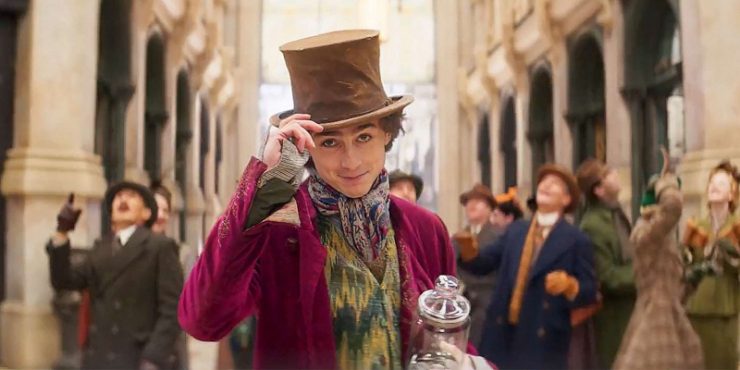Wonka makes it clear pretty early on how much it wants to separate itself from previous versions of the Willy Wonka cinematic universe. The showtune-ification of the character is a deliberate shift from the man we mostly know for punishing misbehaving children in macabre (if not creative) ways. Paul King’s latest film is filled with catchy songs – including one that rhymes “chocolate” exclusively with words that don’t actually rhyme with it – and has Timothée Chalamet in the title role. Chalamet has been a notable performer for six years now, and it seems like he finds a way to succeed in the most preposterous of roles. We can add Wonka to that resume. It’s a film that, if it succeeds at all, it’s because its star’s magnetic charisma wills it.
King is known mostly for having directed the two Paddington movies which are beloved by many. I don’t swoon over those films like some have, though both are incredibly charming. Their level of emotional intelligence is rare in most children’s movies, so it’s fair to hold Wonka to a higher standard than most unnecessary origin stories. Chalamet’s Wonka is an aspiring magician and chocolatier who dreams of opening a magical chocolate shop on the Galeries Gourmet, a Parisian town square known for it’s exquisite chocolate shops. Things begin roughly for Willy, whose illiteracy (you read that right) leads him to sign a lifetime contract for a mean washer woman named Mrs. Scrubitt (Olivia Colman). Another Scrubitt victim, a young girl named Noodle (Calah Lane), tries to warn him, unaware that he can’t read.
Wonka quickly conspires with his fellow prisoners (which include Jim Carter, Natasha Rothwell, Rich Fulcher, and Rakhee Thakrar) to break free. The plan is to open up a chocolate shop, get enough money to pay off Scrubitt, and gain their freedom back. What Willy doesn’t factor is the Chocolate Cartel, led by the three heads of the square’s chocolate empire: Arthur Slugworth (Paterson Joseph), Gerald Prodnose (Matt Lucas), and Felix Fickelgruber (Mathew Baynton). The Cartel crushes all competition, and they have enough chocolate to bribe the chief of police (Keegan-Michael Key) and the local archbishop (Rowan Atkinson). When the three chocolatiers witness first-hand the exquisite taste and magical powers behind Wonka’s chocolate, they do their best to keep Wonka and friends under Scrubitt’s thumb for good.
Despite the film’s marketing scheme to convince you otherwise, Wonka is a very earnest musical. The numbers are unabashedly whimsical, and the cast very much appears to be doing their own singing. King is a filmmaker unafraid of sentimentality, and the film has no shame about playing easy notes for emotional points. Sally Hawkins has about two-and-a-half scenes as Willy’s mother (with an Irish accent, for some inexplicable reason), a small part but for all intents and purposes the most effectively done moments in the movie. Otherwise, Wonka‘s script (by King and Simon Farnaby) relies on contrived plot points, a scheme the movie thinks it can get away with because of Wonka’s magical abilities, but in reality make any attempt at catharsis feel quite hollow.
Hugh Grant plays a single oompa-loompa, stalking Willy to contract payment for some stolen cacao beans from the oompa loompa’s native island. Grant’s role is smaller than you might expect, and is obviously shoe-horned in because you can’t make a Wonka film without an oompa-loompa. How this debt referral transforms itself into the indentured servitude that we’ve seen in the previous Wonka films is beyond me, and is a clue to how little the movie wants you to think about it. This is a very shallow experience, though you if you’re a Chalamet fan (and I am) you will enjoy him playing a different key from his usual roles. Unlike Paddington, Wonka makes the mistake of dumbing itself down in a scheme to appeal to children, which is an insult to childhood discernment and a disservice to the film as a whole.
Directed by Paul King










